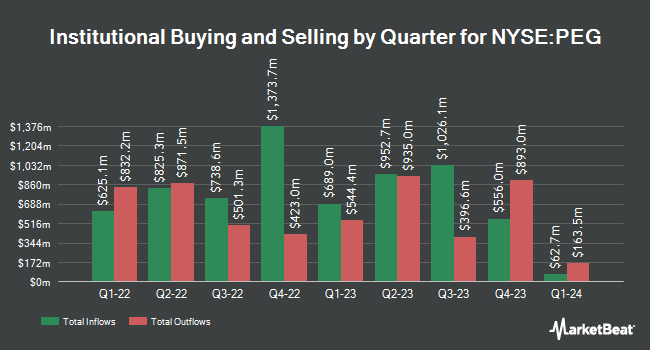AMF Tjanstepension AB bought a new position in Public Service Enterprise Group Incorporated (NYSE:PEG - Free Report) in the 2nd quarter, according to the company in its most recent 13F filing with the SEC. The firm bought 348,981 shares of the utilities provider's stock, valued at approximately $29,395,000. AMF Tjanstepension AB owned 0.07% of Public Service Enterprise Group as of its most recent SEC filing.
Other hedge funds and other institutional investors have also recently modified their holdings of the company. Headlands Technologies LLC bought a new position in shares of Public Service Enterprise Group in the first quarter valued at approximately $32,000. Wealth Preservation Advisors LLC purchased a new stake in Public Service Enterprise Group in the 1st quarter worth approximately $33,000. Marshall & Sullivan Inc. WA bought a new position in Public Service Enterprise Group in the 2nd quarter valued at $33,000. Zions Bancorporation National Association UT purchased a new position in shares of Public Service Enterprise Group during the 1st quarter valued at $50,000. Finally, Sound Income Strategies LLC increased its holdings in shares of Public Service Enterprise Group by 105.9% in the first quarter. Sound Income Strategies LLC now owns 702 shares of the utilities provider's stock worth $58,000 after purchasing an additional 361 shares during the period. 73.34% of the stock is currently owned by institutional investors.
Analysts Set New Price Targets
PEG has been the subject of several research analyst reports. Wall Street Zen raised Public Service Enterprise Group from a "sell" rating to a "hold" rating in a research note on Saturday, September 6th. Weiss Ratings reaffirmed a "buy (b)" rating on shares of Public Service Enterprise Group in a report on Saturday, September 27th. Barclays cut their price objective on Public Service Enterprise Group from $83.00 to $82.00 and set an "equal weight" rating for the company in a report on Thursday, July 10th. UBS Group upped their price objective on shares of Public Service Enterprise Group from $97.00 to $103.00 and gave the stock a "buy" rating in a research report on Friday, July 25th. Finally, Morgan Stanley dropped their target price on shares of Public Service Enterprise Group from $105.00 to $103.00 and set an "overweight" rating for the company in a research report on Thursday, September 25th. Seven equities research analysts have rated the stock with a Buy rating and four have given a Hold rating to the stock. According to MarketBeat.com, the stock presently has a consensus rating of "Moderate Buy" and a consensus price target of $91.85.
Get Our Latest Report on Public Service Enterprise Group
Public Service Enterprise Group Stock Up 0.5%
Shares of NYSE PEG opened at $82.02 on Friday. The stock has a market capitalization of $40.93 billion, a P/E ratio of 20.71, a PEG ratio of 2.83 and a beta of 0.53. Public Service Enterprise Group Incorporated has a one year low of $74.67 and a one year high of $95.22. The firm's 50 day simple moving average is $83.92 and its two-hundred day simple moving average is $82.23. The company has a debt-to-equity ratio of 1.30, a current ratio of 1.00 and a quick ratio of 0.76.
Public Service Enterprise Group (NYSE:PEG - Get Free Report) last announced its quarterly earnings data on Tuesday, August 5th. The utilities provider reported $0.77 earnings per share for the quarter, topping analysts' consensus estimates of $0.70 by $0.07. Public Service Enterprise Group had a net margin of 17.78% and a return on equity of 12.08%. The firm had revenue of $2.81 billion during the quarter, compared to analyst estimates of $2.49 billion. During the same period in the previous year, the business posted $0.63 EPS. The business's quarterly revenue was up 15.8% on a year-over-year basis. Public Service Enterprise Group has set its FY 2025 guidance at 3.940-4.060 EPS. As a group, analysts expect that Public Service Enterprise Group Incorporated will post 3.67 EPS for the current fiscal year.
Public Service Enterprise Group Dividend Announcement
The business also recently disclosed a quarterly dividend, which was paid on Tuesday, September 30th. Stockholders of record on Tuesday, September 9th were issued a $0.63 dividend. The ex-dividend date was Tuesday, September 9th. This represents a $2.52 annualized dividend and a dividend yield of 3.1%. Public Service Enterprise Group's payout ratio is currently 63.64%.
Public Service Enterprise Group Company Profile
(
Free Report)
Public Service Enterprise Group Incorporated, through its subsidiaries, operates in electric and gas utility business in the United States. It operates through PSE&G and PSEG Power segments. The PSE&G segment transmits electricity; distributes electricity and natural gas to residential, commercial, and industrial customers; and appliance services and repairs to customers through its service territory, as well as invests in solar generation projects, and energy efficiency and related programs.
Further Reading

This instant news alert was generated by narrative science technology and financial data from MarketBeat in order to provide readers with the fastest and most accurate reporting. This story was reviewed by MarketBeat's editorial team prior to publication. Please send any questions or comments about this story to contact@marketbeat.com.
Before you consider Public Service Enterprise Group, you'll want to hear this.
MarketBeat keeps track of Wall Street's top-rated and best performing research analysts and the stocks they recommend to their clients on a daily basis. MarketBeat has identified the five stocks that top analysts are quietly whispering to their clients to buy now before the broader market catches on... and Public Service Enterprise Group wasn't on the list.
While Public Service Enterprise Group currently has a Moderate Buy rating among analysts, top-rated analysts believe these five stocks are better buys.
View The Five Stocks Here
Discover the 10 Best High-Yield Dividend Stocks for 2025 and secure reliable income in uncertain markets. Download the report now to identify top dividend payers and avoid common yield traps.
Get This Free Report
Like this article? Share it with a colleague.
Link copied to clipboard.